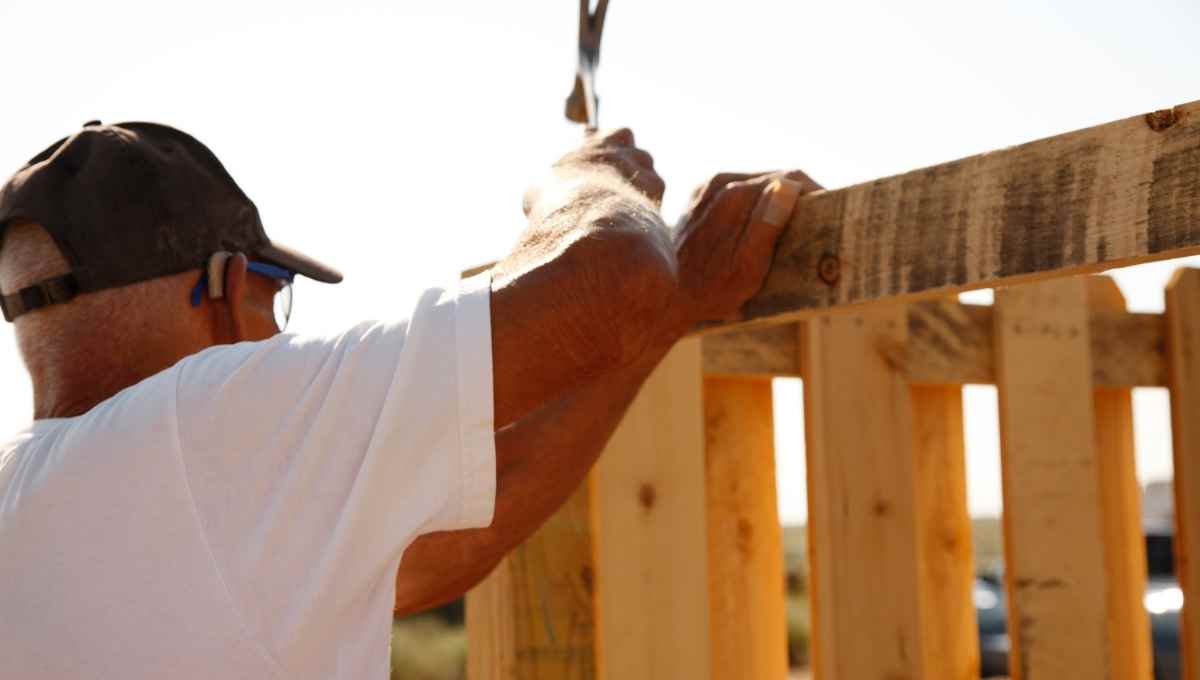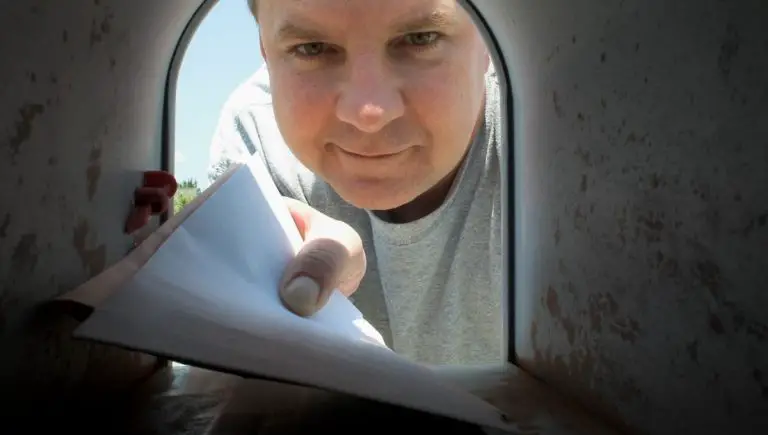Can My Neighbor Move My Fence? (We Checked the Laws)

Having a neighbor claim that your fence is on their property can be quite a surprise. To make matters worse, they may even threaten to move your fence themselves if you don’t. Can they legally move your fence, though?
Your neighbor may be entitled to move your fence if it encroaches on their property. However, they need to be able to prove this and then ask for your permission before they move the fence.
This is a complicated legal matter that we will try to make more straightforward for you. However, if you find yourself in this situation and your neighbor threatens you with legal action, you should obtain legal advice before acting on the situation.
This post contains affiliate links from Amazon and other stores. This means Yard Blogger may earn a commission if you make a purchase using any of our links. Please refer to our full affiliate disclosure policy for full details.
Here’s a Quick Pro Tip!
Your neighbor may have some rights to move your fence if they prove it is on their property. But, they should always ask for your permission, or at least inform you that they are moving the fence.
If they don’t, you might be able to charge them with private nuisance. But, you will need proof.
Having a decent security system like a Ring Video Doorbell or Outdoor Security Cameras (both on Amazon) will provide you with excellent footage to catch your neighbor in action.
Your Neighbors Rights Regarding Your Fence
Before we jump into the legalities of this issue, let’s discuss if your neighbor is actually allowed to move your fence regardless of whether it is on their property or not.
Can My Neighbor Move My Fence If It’s On His Property?
If your fence is on your neighbor’s property, they may have rights regarding your fence. However, they will need to ask your permission before removing the fence themselves since it will also disrupt your property.
This situation is very complicated, and many factors can change the outcome. But, essentially, your neighbor does have rights to your fence if it is, in fact, on his property.
Since the fence is on your neighbor’s property, they have the right to remove it or claim ownership of it if they wish. Yet, this does not mean that your neighbor can just go ahead and move the fence on his own.
Can My Neighbor Take Down My Fence?
If your fence is encroaching on your neighbor’s property, they may have the right to take it down. However, this does not mean they can take it down themselves whenever they want without asking your permission.
Your neighbor needs to ask for your permission before they take down the fence, especially if you paid and put up the fence yourself.
If you paid for the fence and installed it yourself, you have more rights to the fence than if you didn’t put it up.
If you didn’t put it up, you don’t have almost any rights to it, but you may be less liable. In either case, your neighbor needs to first discuss the situation with you and then ask for permission to take it down.
Your property will be affected when your neighbor takes the fence down or gets someone else to. So, your neighbor needs to discuss how the property will be fixed once the fence comes out.
Can My Neighbor Complain About My Fence?
If your fence is actually on your neighbor’s property, your neighbor can complain about the fence. However, your neighbor should first discuss the situation with you.
But, if you don’t agree to him taking the fence down, your neighbor can go to the municipality or a lawyer.
If your neighbor does go to a lawyer, you should go to one as well since this situation may end up in civil court.
You might also enjoy our post on If Your Neighbor Can Remove Your Boundary Fence
Determining Who Owns the Fence
Now that we have determined that it is really not okay for your neighbor to move your fence, we need to determine who actually owns it.
Here are ways to help you make this determination and some things you can do when your neighbor approaches you.
What Do I Do if My Neighbor Says I’m Encroaching on Their Property?
If your neighbor believes you are encroaching on their property, you need to search for documents proving your property lines. This can be anything from a land survey to a title deed.
You are only technically encroaching on your neighbor’s property if something has been built on their property. However, property lines can be very blurry unless proved by official documents.
You should look for the original land survey that you got when you were buying the house. Your title deed will also clarify where your property boundaries are.
Consult with these documents before believing your neighbor that you are encroaching on their property.
Does My Neighbor Own My Fence if It Is Built on His Property?
If your fence is built on your neighbor’s property, the ownership rights are usually determined by who bought and installed the fence. If you bought and installed the fence, you have certain rights to it.
However, since the fence was actually built on your neighbor’s property, your neighbor also has rights to it.
On the other hand, if you bought the house with the fence already installed, your neighbor may have more rights to it than you do. Therefore, it is likely that your neighbor can claim ownership.
How Can My Neighbor Prove My Fence Is on His Property?
Your neighbor can prove that your fence is on his property by consulting his land surveys and title deeds. These documents will show the legal boundaries of his property.
Typically, if someone buys a property, a land surveyor comes and distinguishes where the property lies.
Your neighbor will most likely have this document and can show you where his property lines are. This is a very official proof of documentation.
But, if your neighbor does not have this document, nor does he have a title deed, then your neighbor does not have any rights at the moment to say that the fence is on his property.
You can ask him to provide you with these documents before doing anything about your fence.
How Do You Tell If a Fence is Yours or Your Neighbors?
To tell if a fence is yours or your neighbor’s, you will have to consult official documents that prove where your property lines are. You can find this information and either a title deed or a land survey.
If you have not had to consult a land survey in the past, you likely do not have it on hand. To hunt down your survey, you can contact your local government office.
They may be able to access it through the building or zoning department. Or, you can contact the real estate lawyer you used when buying your home.
Once you have this document, you will be able to tell where your property lines are. If the fence is built directly on the property line, the fence is actually a boundary fence.
On the other hand, if the fence is built on your neighbor’s property, the fence somewhat belongs to them.
You might also enjoy our post on If Your Neighbor Can Claim Your Land By Mowing It
Do Title Deeds Show Boundaries?
Title Deeds do show boundaries, so this is an excellent asset if you need to prove where your property ends and begins. However, title deeds typically do not clarify who is responsible or owns specific structures on the boundaries, such as fences.
Although the title deed will not be able to confirm whether or not you own your fence, it will confirm where your property boundaries are.
This will help you prove to your neighbor that the fence is on your property- if that is the case.
How Do I Prove a Fence Is a Boundary Fence?
You can prove a fence is a boundary fence by consulting with your land survey and title deed. Your title deed will show the fence but will not prove who owns it. However, if it lies directly on the property line, it is indeed a boundary fence.
A boundary fence is a fence that lies directly on a property line. So, if your title deed shows a fence on your property line, then the fence belongs to you and your neighbor.
However, if the fence lies on either side of the property line, then the fence belongs to whoever’s side the fence is on. There will typically be a capital T in a title deed on the owner’s side of the fence.
If you are dealing with a boundary fence issue, you may also find this article helpful that discusses whether or not your neighbor can remove your boundary fence.
What is a Boundary Fence?
A boundary fence is a fence that lies directly on the property lines between two houses. The fence provides privacy for the adjacent homes.
Both parties are responsible for maintaining the fence since the fence is technically on both properties. However, the neighbors can agree to decide who takes care of the fence if one neighbor doesn’t want to.
What Is a Boundary Dispute?
A boundary dispute is when two owners of adjacent properties disagree on where their property begins and ends. They enter into a dispute as soon as there is a disagreement.
It can be difficult to prove property lines because sometimes it takes digging up old records that aren’t necessarily easy to find.
Sometimes these records don’t even exist, and the property owners will have to go to court to decide on new property boundaries.
How Can You Tell if a Fence Is Yours?
You can tell if a fence belongs to you by accessing certain documents that prove where your boundary lines are. The document can either be a title deed or a land survey.
If you do not have access to these documents, you can contact your local government officials, who may be able to contact the local building and zoning office.
This department should have these documents on file. Or, you can contact your real estate lawyer, whom you used to when purchasing your property.
You might also enjoy our post on If Your Neighbor Can Paint Your Fence
What Is a Land Survey?
A land survey is a process performed by a land surveyor who inspects your property to determine where your property boundaries lie. They will conclude the information in a land survey document.
Typically, when you buy a house, a land survey is included with your title deed to be aware of the property you are buying.
However, sometimes these documents are not included. You may have to consult with your local government office or your real estate lawyer to access these documents.
These documents will greatly help you to determine if your fence is indeed yours or your neighbor’s.
If the Fence is Indeed On Your Neighbor’s Property – What Now?
After your investigation about deciding who actually owns the fence, you may find out that it is indeed on your neighbor’s property.
Next, we have to figure out how you can best approach this situation and what your neighbor can do about it.
Can I Get Sued if My Fence Is Actually on My Neighbor’s Property?
You may get sued if you find out that your fence is actually on your neighbor’s property. However, you have less chance of getting sued if you did not purchase or install the fence.
If you did not buy and install the fence, your neighbor does not have many rights to sue you.
However, if you purchased and installed the fence yourself, your neighbor may have the right to sue you for trespassing.
If you believe that your neighbor is looking to sue you, you should consult with a legal office and obtain legal advice from them on how to go about the specific situation.
Can I Claim Adverse Possession if My Fence Is on Their Property?
You may be able to claim adverse possession of the fence on your neighbor’s property if you have been maintaining the fence and the area around it for at least 12 years.
If you are thinking about claiming adverse possession for your fence, here are some things you need to consider:
- You must have used the land around the fence for at least ten years
- You need to prove exclusive control over the land and the fence
- You need to prove that you had the intent to possess the land and fence during your use
- You need to prove that you did not have the consent of the owner of the land and fence to use and maintain it
Can My Neighbor Remove the Fence Himself?
Your neighbor is not technically allowed to remove the fence himself. Instead, your neighbor should use a contractor to remove the fence and ask for your permission before doing so.
Removing a fence can be dangerous and complicated if water or gas lines are involved. Therefore, your neighbor needs to hire a contractor to assess the area and then remove the fence.
If your neighbor does not do this, he can be held liable for any damages that result to your property from removing the fence.
Can I Move My Fence to My Side of the Property?
You may be technically allowed to move your fence to your side of the property, but only if you ask for your neighbor’s permission.
This is because the fence is on their property. You need permission to access the property and then permission to disrupt their land. You could be charged with trespassing and private nuisance if you do not.
Can My Neighbor Rebuild a Fence on the Property Line?
Your neighbor can rebuild a fence on the property line as long as he asks for your permission. A fence on the property line is technically a boundary fence, and your neighbor cannot install this until both parties have permission to have it.
As stated, your neighbor will have to ask you for permission before they can build a fence on the property line.
This fence would be considered a boundary fence, and he needs your approval before you can build it. You also need to determine if you are both going to look after the fence or if only he will look after the fence.
Will My Neighbor Pay For the Yard Work Once the Fence Is Down?
If your neighbor chooses to remove your fence, fixing the fence’s land needs to be included in the process, especially if you did not install the fence yourself.
If your neighbor chooses to take down your fence, he should be responsible for all the costs and repair of the land.
If you installed the fence incorrectly on their property, he might ask you to pay for part of the removal. Therefore, it would be wise for you two to speak and come to a fair agreement.
You might also enjoy our post on If You Can Throw Your Neighbor’s Leaves On Their Property
Can I Build a Fence Next to My Neighbor’s Fence?
You are technically allowed to build a fence next to your neighbor’s fence. Since you own your property, you are allowed to do whatever you like with it, for the most part.
However, you need to consider that if you build a fence next to your neighbor’s fence, it will be difficult to mow the grass between the fence.
In most municipalities, you need to maintain your grass levels. If the grass that is not being mowed is on your property, you could get into some trouble with your municipality.
Keep in mind that you need to obtain a permit before putting in a fence.
So, if there are any issues about putting a fence beside your neighbors, the governing authority who authorizes your permit will let you know.
Do I Have to Pay For the Removal of the Fence?
If you accidentally put up a fence on your neighbor’s property and they want you to remove it, you will likely have to pay for the removal. However, you can agree with your neighbor in a way that does not involve the law or the city.
If your neighbor does not want to pay for the removal of the fence, then it is in your best interest to pay for it yourself.
They can likely accuse you of encroaching on their property, and you may get charged with trespassing and private nuisance.
Related Questions
Neighbor’s Fence Fell on My Property
If your neighbor’s fence fell on your property because your neighbor was neglecting the fence, you are not responsible for the cleanup or damages.
Sometimes negligence can cause a fence to rot, weakening its support structures causing it to fall. If this is the case, your neighbor is responsible for cleaning up the fallen fence and repairing any damage to your property.
But, if the fence fell due to a natural disaster, such as a wind storm or earthquake, you can’t necessarily hold your neighbor liable.
The best thing you can do is help your neighbor clean up the fence and fix any property damages.
Final Thoughts
Hopefully, you have a better understanding of what to do when your neighbor accuses you that your fence is actually on their property.
If your neighbor is harassing you or causing you great distress, you should consult with a legal professional to obtain legal advice on the situation.
But, if you and your neighbor can have a conversation about the fence, you should try to come to a mutual agreement that doesn’t involve the law or the municipality.
This will make both of your lives easier and maintain your positive neighborly relationship.






